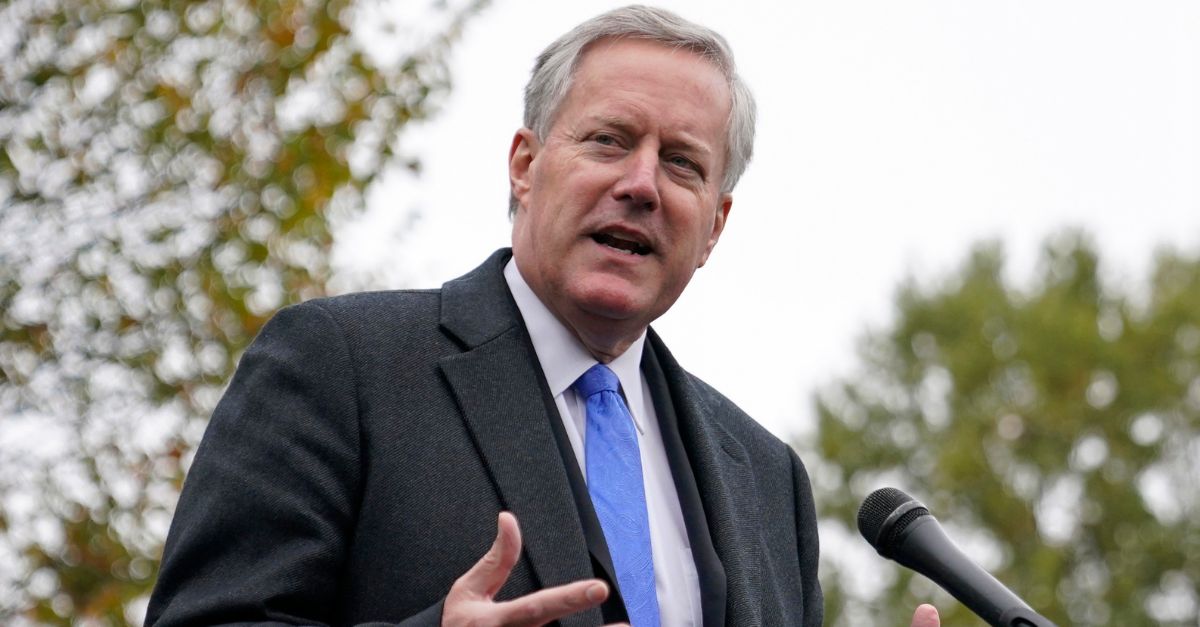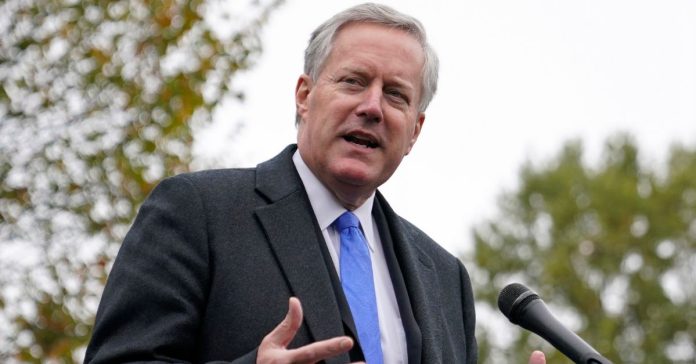
FILE – White House chief of staff Mark Meadows speaks with reporters outside the White House, Monday, Oct. 26, 2020, in Washington. A federal appeals court will hear arguments Friday, Dec. 15, 2023, over whether the election interference charges filed against Trump White House chief of staff Mark Meadows should be moved from a state court to a federal court. (AP Photo/Patrick Semansky, File)
Former President Donald Trump’s chief of staff Mark Meadows has lost his bid to have the racketeering charges lodged against him in Georgia moved to federal court — again.
A three-judge panel from the 11th U.S. Circuit Court of Appeals ruled on Monday that the law doesn’t support Meadows’ effort to land the case before federal judges. Meadows was charged in Fulton County District Attorney Fani Willis’ expansive indictment of Trump and more than a dozen other co-defendants accused of racketeering and criminal conspiracy for allegedly trying to overturn the results of the 2020 presidential election in the Peach State.
Meadows wanted a federal judge to hear his case and argued that any steps he took in Georgia were taken in connection with his responsibilities as a federal official.
His legal position, the judges said, is untenable.
“Meadows’s theory of the case is not plausible,” the opinion said. The ruling found that Meadows’ expansive definition of his job responsibilities was misguided.
“We cannot rubber stand Meadows’s legal opinion that the President’s chief of staff has unfettered authority,” the judges added.
As Law&Crime previously reported, the appellate judges appeared skeptical of Meadows’ position. On Friday, Chief U.S. Circuit Judge William Holcombe Pryor, Jr., along with U.S. Circuit Judges Robin S. Rosenbaum and Nancy G. Abudu, heard oral arguments and grilled Meadows’ lawyer George Terwilliger on why former federal officials like Meadows should be able to use the statute designed to shield current officials from prosecution for acts taken under the color of their office.
If the opinion is any indication, the judges were not convinced.
“Simply put,” the judges wrote, “whatever the precise contours of Meadows’s official authority, that authority did not extend to an alleged conspiracy to overturn valid election results.”
Nor did Meadows’ official duties “include interference with state election procedures,” the opinion says. “Meadows offers no official rationale for traveling to Cobb County and attempting to infiltrate the nonpublic signature-match audit being performed by law enforcement officers.”
“At bottom, whatever the chief of staff’s role with respect to state election administration, that role does not include altering valid election results in favor of a particular candidate,” the judges wrote. “So there is no ‘causal connection’ between Meadows’s ‘official authority’ and his alleged participation in the conspiracy.”
The ruling affirms U.S. District Judge Steve Jones’ September decision that Meadows had failed to clear the “quite low” bar for removal. Jones, a Barack Obama appointee, wrote that only one of the eight alleged overt acts outlined in the Fulton County RICO indictment against Meadows “could have occurred within the scope of Meadows’s federal office.”
The circuit court opinion was written by Pryor, a George W. Bush appointee. Rosenbaum, a Barack Obama appointee, wrote a concurrence, in which Abudu, a Biden appointee, joined.
In her concurrence, Rosenbaum described a “nightmare scenario” in which a former president could face “a rogue state’s weaponization of the prosecution power to go unchecked and fester,” particularly in states where that president’s policies were unpopular. However, she acknowledged that current law simply doesn’t support a different interpretation.
“Of course, my role as a judge does not allow me to rewrite laws to fit my view of what’s wise,” the judge wrote. “So today I join the Majority Opinion because it does that.”
Law&Crime’s Matt Naham contributed to this report.
Have a tip we should know? [email protected]

